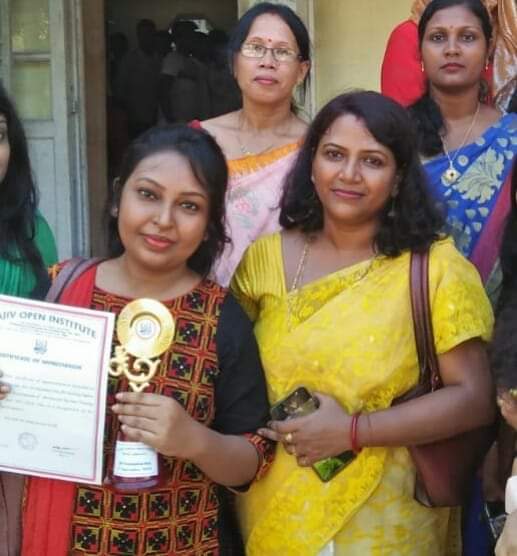
Chandralekha Das, a teacher and mass communication expert from Silchar, Assam, who is a kidney transplant patient, emphasises that a successful kidney transplant may allow you to live the kind of life you were living before you got kidney disease. Read her triumph over death.
Eight years ago, at 28, I was diagnosed with Chronic Kidney Disease.
I was in Bangalore, rushing to office one fine morning, when suddenly I suffered an acute bout of breathlessness. I felt numb and weak, and dizzy. I dragged myself back home. On seeing me gasping for breath, my husband rushed me to a nearby hospital. There, I was immediately put on a nebulizer. My blood pressure was high at 220/120 and my feet and ankles were swollen. On seeing my condition, the doctor advised a series of tests like creatinine, hemoglobin and kidney function.
When the results came out, the doctor called both my husband and me inside the clinic. ‘The results are not good,” he said looking alarmed. “You are in the last stages of kidney failure. You need to start getting dialysis right away and consider a kidney transplant.”
Never heard of kidney transplant
I froze with fear. That was horrible news. I had never heard of anyone with a kidney transplant. I thought my life was ruined and I was going to die.
I was admitted to the ICU. My head was pounding. Ironically, there was an air of jubilation in my family as my brother was expecting his first child. On 16th February, 2012, the day my niece was born, was the also day my family learnt about my kidney failure.
I am from Silchar, Assam. As my neighbours and friends got to know about my condition, there was shocked. My friends found it hard to belief that I had kidney problem, especially because I had always been very particular about my health. I would always eat nutritious food, and had stayed away from junk. I would consciously use less oil in my cooking and would drink enough water. Amongst my friends, I was the only one practising yoga regularly. “Then why me?” was the question on everybody’s mind.
Anyway my husband started looking after me at home. He started preparing food without salt, taking me to the hospital, getting all my tests done. He was very supportive. My parents were in Silchar; my father was 75 years old, and my mother was battling severe arthritis.
The doctor in Bangalore informed us that there was waiting period for kidney transplants. It would take several months or more to find a donor. My health was deteriorating rapidly. I didn’t know whether I would be able to wait that long. Meanwhile, my brother began search for kidney donor in Guwahati. I decided shift to Silchar, as my husband’s leave was getting exhausted.
I had been in Silchar for about three months, when an ugly incident occurred that broke me emotionally and struck me even harder than the news about my kidney failure. My husband came home one day, and brusquely pronounced: “I cannot stay with an ill person all my life. I want a divorce.” I was shocked. I tried to talk to him and coax him that all will be well, but he had made up his mind. He was quite adamant about calling off our marriage.
I was totally shattered and depressed. I would lock myself in a room and would not see anyone. I could not sleep at night, and would remain curled up and shivering for long hours. My family took me to many psychiatrists and I would mechanically have their medicines.
Critically ill
My health was in a critical state now. My creatinine level had shot up to above 7, while my weight had come down to 30 kg. I could not sit up at all and was found it difficult even to keep my eyes. Once again, I was rushed to the ICU and put on an oxygen mask. The doctors warned my family that it would be difficult for me to survive long.
I had still not found a kidney donor.
On seeing me on my death bed, my mother came forward, despite all her health complications, and volunteered to donate one of her kidneys. The next day, my mother and I were scheduled to fly. Although I was in no condition to undertake the long journey from Silchar to Kolkata to Hyderabad, I somehow survived with the support of my family, the grace of god and my firm belief in SGI (Soka Gakkai International, Buddhist practice of chanting and sharing the teaching of Buddhism with others in order to help them overcome their problems).
I was admitted to Care Hospitals in Hyderabad. From next day my dialysis started. Earlier, my dialysis was 3 times a week, but now it was everyday. I told my mother, I will not be able to survive the operation. My mother held my hand tightly and reassured me with a quiet, firm gaze.
Transplant successful
My operation as performed 3 days prior to my birthday on 23rd August. When I gained consciousness and the doctors told me that the transplant had been successful, I looked at my mother and in my mind thanked for giving a second life.
After my operation, I was given a heavy dose to immunosuppressant medicines to accept the ‘foreign’ kidney smoothly and prevent infection. I was kept isolated in a separate room where visitors were not allowed. I was given only freshly cooked food and had to wear a mask to prevent any infection. I was also given steroids, which had a plenty of side effects.
But no pain or discomfort mattered. The fact that I was alive was most important.
Seven years on
It has been 7 years to my kidney transplant, I lead an absolutely normal life now. My medicines are being gradually reduced. I think my kidney disease has changed me beautifully. I have become an extrovert and more confident person. I cherish every moment of my life and pursue my passions of singing and writing.

The one thing I am extremely particular about is the timings of my medicine. Wherever I am, whether in an autorickshaw, outside in the market, or in between classes, I stop and take my medicines dot on time.
Advice to kidney patients
My advice and suggestions to other kidney patients would be:
- Keep yourself strong mentally. People become weak when they hear of kidney failure. But it is not the end of the world. You can lead a normal life even after a transplant.
- Be active both mentally and physically. It keeps you fit and recharged.
- Eat wholesome food, with moderate consumption of salt and sugar.
- Be positive. It gives you an extra ounce of energy.
- Lastly, take adequate rest, along with hard work.






